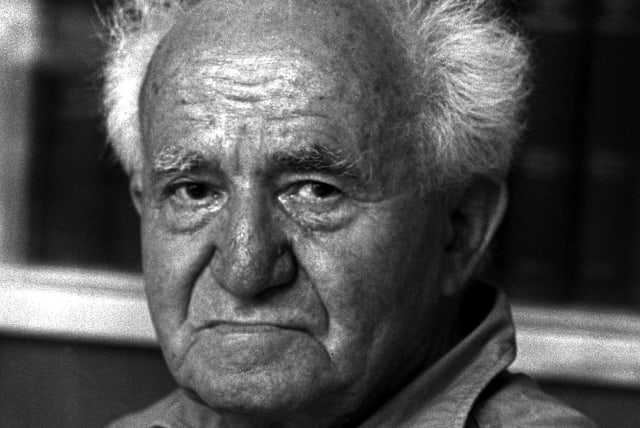Israel Elections: What are essential attributes of a good leader? - opinion

Interestingly enough, in just a few verses in our weekly portion (Numbers 27:15-17), we have four different answers to that question.
Unfortunately, the State of Israel is once again heading toward an election. As we choose our leaders for the fifth time in three years, we must ask: What are the essential attributes of a good leader?
But before I answer that question, I want to say something about the Jewish people. In a famous passage in this week’s Torah portion of Pinhas, the mantle of leadership is passed from Moses to Joshua. In one of the verses, God says to Moses: “and you shall commission him [i.e., Joshua] in their sight” (Numbers 27:19). Rashi says: “You shall commission him – over Israel; know that the Jewish people are troublesome and obstinate.” It’s nice to know there’s nothing new under the sun!
This reminds me of a famous story about David Ben-Gurion meeting John F. Kennedy in the early 1960s. President Kennedy says, “it’s really hard to be president of the United States. I’m the president of 190 million citizens!” And Ben-Gurion replies, “No, it’s much harder to be the prime minister of Israel. I’m the prime minister of 2.3 million prime ministers!” Indeed, it is very hard to be the leader of the Jewish people in the State of Israel.
WHAT ARE the attributes which we must look for in a good leader? Interestingly enough, in just a few verses in our weekly portion (Numbers 27:15-17), we have four different answers to that question. Here are the verses, with an emphasis on the four different answers:
“And Moses spoke to the Lord, saying:
Let the Lord, God of the spirits of all flesh,
appoint a man over the community,
who shall go out before them and come in before them,
and who shall take them out and bring them in,
so that the Lord’s community
may not be like sheep that have
no shepherd.”
Why does it say spirits in the plural?
Rashi replies, quoting Midrash Tanhuma: “appoint over them a leader who will tolerate each and every person according to his opinion.” The reason it says “spirits” in the plural, is that God should appoint a person who understands the “spirits” of the Jewish people. Not the “spirit” in the singular, but the “spirits” in the plural. In other words, a person who can tolerate every single individual in his community or his people.
The second attribute: It says “appoint a man over the community.” This reminds us of a famous Mishnah in Pirkei Avot 2:5: “and in a place where there are no men, strive to be a man.” In other words, in a place where there is no leadership or where people are not saying or doing the right thing, the leader must not be afraid to say and do the right thing. He has to be “the man,” the person who does that.
The third attribute is in the phrase, “who shall go out before them and come in before them.” Rashi explains, following Sifrei, that it’s talking about going out and coming in, in battle. As we are told about King David in I Samuel 18:16: “because he goes out and comes in before them.”
However, Rabbi Ovadiah Seforno, who lived in Italy 500 years ago, says: “‘who shall go out before them’ – in matters of war; ‘and who shall take them out’ – in matters of leading the state.” In other words, the leader has to, on the one hand, lead the people in war if necessary, but on the other hand, lead them in peace, which is much more important.
Finally, the fourth attribute is that the Jewish people should not be “like sheep which have no shepherd.” This reminds us of the well-known passage about Moses in Exodus 3:1: “and Moses was shepherding the sheep of his father-in-law Jethro, priest of Midian; and he led the sheep beyond the wilderness.” A famous Midrash says that because Moses knew how to take care of each and every lamb, he would also know how to take care of each and every member of the Jewish people.
Thus, we see in this brief passage about leadership that there are four attributes that we need to look for in our leaders: that he should understand and tolerate the spirit of every individual; “in a place where there are no men, strive to be a man”; to lead them in war and in peace; and to look after every individual as a shepherd looks after every sheep in his flock.
May we have the wisdom to choose such leaders for the State of Israel.
The writer is president of The Schechter Institutes, Inc., in Jerusalem.
Jerusalem Post Store
`; document.getElementById("linkPremium").innerHTML = cont; var divWithLink = document.getElementById("premium-link"); if (divWithLink !== null && divWithLink !== 'undefined') { divWithLink.style.border = "solid 1px #cb0f3e"; divWithLink.style.textAlign = "center"; divWithLink.style.marginBottom = "15px"; divWithLink.style.marginTop = "15px"; divWithLink.style.width = "100%"; divWithLink.style.backgroundColor = "#122952"; divWithLink.style.color = "#ffffff"; divWithLink.style.lineHeight = "1.5"; } } (function (v, i) { });

